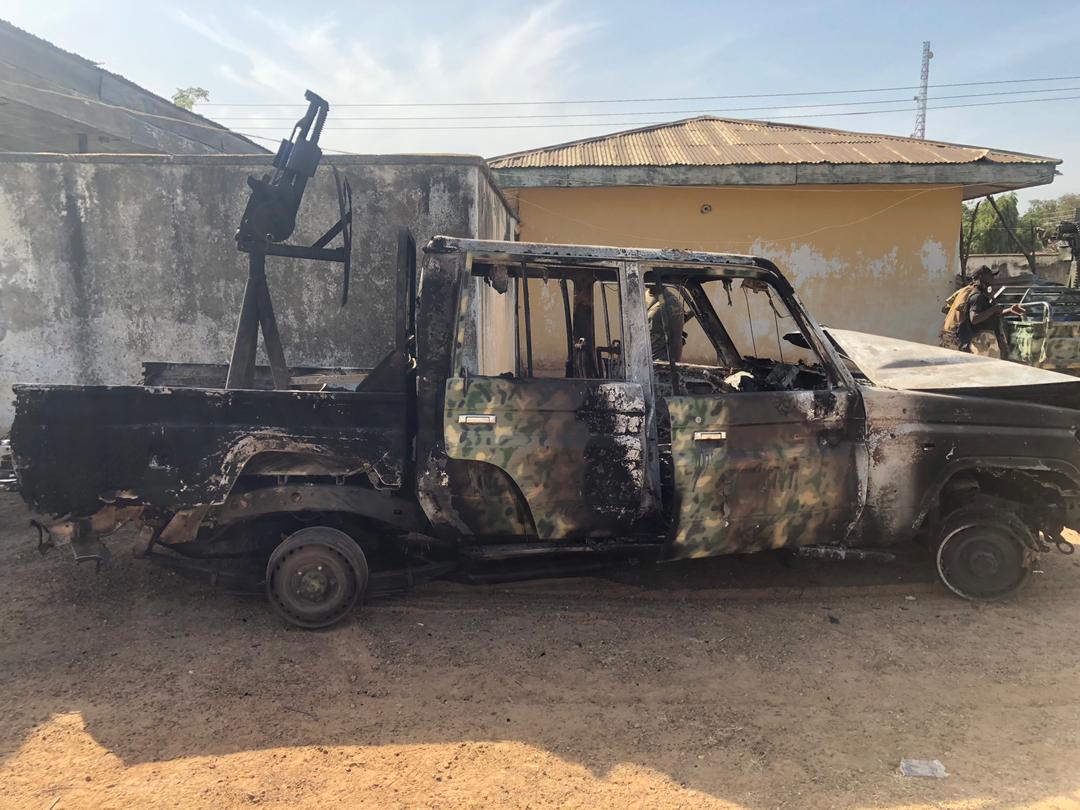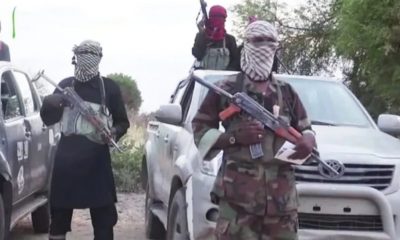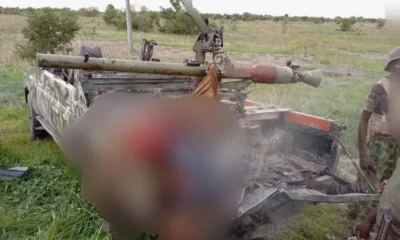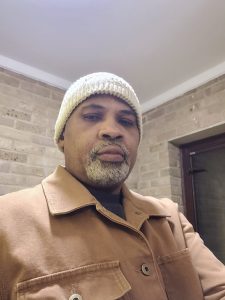ISWAP
BLOODBATH IN ISWAP CAMP OVER DISAPPROVAL OF THE APPOINTMENT OF AMIR ALIYU CHAKKAR AS GOVERNOR OF LAKE CHAD REGION

The newly appointed Governor of the Lake Chad Basin region, Amir Aliyu Chakkar, also narrowly escaped assassination. However, he was saved by his loyalist commanders, including Mohammed Maluma, Ali Hussaini and Ali Musak, all high-ranking ISWAP field Commanders staunchly loyal to him.
Sources say the bloodbath was triggered by bitter disapproval of the process and selection criteria employed in the appointment of Amir Aliyu Chakkar by the Shura. Some ISWAP commanders were not happy with the little-known Amir Aliyu Chakkar to lead what has been described as the most powerful command and control position. They envisage that by implications, he would control ISWAP operations in the entire fringes and countries of the Lake Chad Basin States; Cameroon, Nigeria, Niger, and the Chad Republic also expand into the Sahel region via the Niger Republic.
The opposing unit commanders fiercely argued that the appointment of Amir Aliyu Chakkar by the Shura Council was not based on merit, with some commanders pointing fingers on tribal affiliations, friendship and outright collusion pattern within the ISWAP leadership style. The bitter rejection of Aliyu Chakkar as the new Governor by commanders of opposing units turned into a bitter brawl and an ensuing gunfight.
Background to the Crisis
It will be recalled that the ISWAP Shura council had recently appointed Aliyu Chakkar as its new Governor of the Lake Chad region. The newly appointed “Governor” in his determined effort to consolidate his position, he went to Koyowa. He was spotted en route to see their supreme leader, Amir Ba-Lawan, the ISWAP leader at Koyowa, along with three of his trusted lieutenants; Mohammed Maluma, Ali Hussaini Ali Musak, all high-ranking ISWAP field Commanders. Very reliable sources stated that while at Koyowa, the ISWAP Headquarters, Ba-Lawan handed over the Lake Chad region’s mantle of leadership to the new “Governor.
” On receiving his official appointment, Chakkar has sworn to consolidate on the command and control successes recorded by late Goni Maina. He promised to sustain previous plans of launching indiscriminate attacks in the coming months; presumably December 2020 and January/February of 2021 on unconfirmed military and civilian targets.
Chakkar and his group of loyalists fighters returned to Sabon Tumbu and Jubularam for a familiarisation tour. He is reported to have proceeded to his newly established command and control base at a location named as Doron Buhari. It is situated around the north of Kirta and east of Bakkassi town, where he was received by some other key ISWAP leaders including Malam Abubakar Dan Buduma, Amir Bin Umar, and Commander Hakilu.
The announcement of his leadership tour at Doron Buhari’ command and control’ hideout camp, led to bitter disapproval and petition by some key ISWAP commanders forcing ISWAP leader – Ba Lawan to summon Aliyu Chakkar back to Koyowa for clarification. While there, fighting broke out as opposing ISWAP commanders refused to pay respect to the new warlord.
Some commanders loyal to Ba-Lawan, the newly appointed “Governor” and Abu Musab Al-Barnawi, one of the surviving sons of Boko Haram terrorists group’s founder Muhammed Yusuf, blamed the incident on commanders who still retain connections and loyalty to the disabled veteran JAS leader, Abubakar Shekau, the ‘mother group’ of ISWAP.
It will be recalled that Amir Aliyu Chakkar replaced Amir Goni Maina after the ISWAP then “Governor” was eliminated in a Nigerian Army and Nigerian Air Force coordinated military bombardment. Goni Maina was killed alongside more than 100 jihadists in an intelligence led parallel operation while in the process of conducting a strategic leadership and operational meetings at Sabon Tumbu, Ingilwa, Tundun Wulgo, Jubularam and Abbaganaram fringes of the Lake Chad on December 1st, 2020.
Immediate Impact
Fierce leadership disagreements leading to bloody infighting amongst ISWAP jihadist-leads to confusion, distrust, temporary suspension of coordinated planning, and a limited engagement in violent activities. Depending on the severity of the rupture and the influence of the shura council on unit commanders involved, splinter units could emerge with enthusiasm and or desperation to launch soft and hard target attacks useful for structural setup. This could lead to kidnapping for ransom, setting up of illegal road blogs, cattle rustling and other locally viable organised crime activities in their areas of operation and control.
Advisory notes
The appointment and leadership of Amir Aliyu Chakkar by the Shura council and the ensuing bloody infighting will undoubtedly trigger a wave of planned and directed attacks against soft civilian and hard military targets. This is to consolidate his controversial appointment amongst the leadership at least. Deliberate attacks could target military positions, routes and vulnerable towns around the Timbuktu triangle and the Lake Chad basin states.
New alliances are likely to be forged with external jihadists units in the Sahel via links with Niger Republic units. From a counter-insurgency perspective, there is no better time for the Nigerian security services and regional lake chad basin states to pounce on ISWAP leadership headquarters than now. The group was experiencing low morale, confusion and operational disarray and were busy burying their dead and licking big self-inflicted wounds.
If you see something- say something immediately. This is the people’s war – the security services can only win if the people are willing and protected to play an active role in timely information sharing.

Business
Elon Musk’s Team Accuses FEMA of Misusing $59 Million to House Illegal Migrants in Luxury Hotels

Elon Musk’s Team Accuses FEMA of Misusing $59 Million to House Illegal Migrants in Luxury Hotels
Elon Musk’s Department of Government Efficiency (DOGE) has made serious allegations against the Federal Emergency Management Agency (FEMA), claiming that the agency misused $59 million to accommodate illegal migrants in luxurious hotels.
The billionaire entrepreneur revealed this in a tweet on Monday morning, stating that the discovery was made last week. According to Musk, the funds were intended for American disaster relief but were instead diverted in violation of national regulations.
He wrote: “The @DOGE team just discovered that FEMA sent $59M LAST WEEK to luxury hotels in New York City to house illegal migrants. Sending this money violated the law and is in gross insubordination to the President’s executive order. That money is meant for American disaster relief and instead is being spent on high-end hotels for illegals! A clawback demand will be made today to recoup those funds.”
The revelation has sparked controversy, with critics arguing that FEMA’s allocation of funds should prioritize American citizens affected by disasters. The allegations have also intensified scrutiny on FEMA, which has faced previous accusations of financial mismanagement.
An inspector general audit recently revealed that FEMA mishandled nearly $10 billion in COVID-19 relief funds. The audit stated that $8.1 billion in costs remained questionable, while $1.5 billion was allocated prematurely and could have been better utilized for other emergencies.
As scrutiny mounts, former President Donald Trump has reportedly considered abolishing FEMA, describing the agency as “a disaster.” To address these concerns, Trump has established a council, led by Homeland Security Secretary Kristi Noem and Defense Secretary Pete Hegseth, to review FEMA’s operations and propose necessary reforms by late June.
The allegations against FEMA have triggered a broader debate on the proper allocation of taxpayer funds and the government’s role in disaster management. More updates are expected as the situation develops.
Business
Shepherd freight Cargo services Now in Lagos and Ibadan Nigeria

Shepherd freight Cargo services Now in Lagos and Ibadan Nigeria.
Business
Access Holdings: Imprints of a Thriving Banking Powerhouse

Access Holdings: Imprints of a Thriving Banking Powerhouse, By Bolaji Israel
Access Holdings has continued to evolve and reinforce its corporate stature as a formidable force in Nigeria’s financial sector, demonstrating capacity for relentless growth, resilience and ambition through strategic expansion and innovative approaches. The entity owes its significant bulk to the Access Bank Group, supported by other allied services firms.
Also known as Access Corporation, the group has grown over the last 35 years to emerge as Nigeria’s largest financial holding company, offering services such as commercial banking, lending, payment, insurance, and asset management.
Though Access started off as a corporate bank, it swiftly expanded into personal and business banking in 2012, solidifying its role as a well rounded financial solutions provider.
In his memoir, ‘Leaving the Tarmac: Buying a Bank in Africa, ‘ Aigboje Aig-Imoukhuede detailed how himself and his partner, Herbert Wigwe walked the delicate path of buying Access Bank and never looked back since.
The bank’s acquisition in March 2022 by the maverick duo of Aig-Imoukhuede and Wigwe, which changed its entire growth, profit and branding trajectory as well as its merger with Diamond Bank in 2019 which shot up its customer base to over 42 million, granting it a status of the largest bank in Africa by customer base and the largest in Nigeria by assets, form a part of its remarkable and turnaround milestone.
With a keen focus on digitisation-driven growth and customer satisfaction, it has not only solidified its status in Nigeria but has also set its sights on becoming a formidable player in the international banking arena.
The group’s growth and expansion drive has been marked by a series of strategic acquisitions and mergers aimed at enhancing its market presence and delivering value to customers. In 2021, Access Bank acquired African Banking Corporation (ABC Holdings), a move that significantly bolstered its operations in Southern Africa. This acquisition allowed Access Bank to enter markets such as Botswana, Mozambique, and Zambia, thereby enhancing its regional footprint and customer base.
In addition to its African ventures, Access Holding has been eyeing opportunities in Europe and Asia. Recent announcements highlight the bank’s interest in potential partnerships and acquisitions that could facilitate its entry into these lucrative markets. The bank’s management has stated, “We are committed to diversifying our operations and exploring new markets that align with our growth strategy.”
The results of the expansion efforts have been promising. For the year ending 2023, Access Holding reported a staggering 300 percent growth in profit after tax to N612.4 billion, from N204.1 billion in 2022. This represents the largest profit ever recorded by the company, under the leadership of its late co-founder, Herbert Wigwe.
It revenue soared by 80% to N2.6 trillion, from N1.4 trillion in 2022 while assets rose by 78% to N26.7 trillion, from N14.99 trillion in 2022, marking a significant growth trajectory that positions Access Holding as one of Nigeria’s largest and most influential banks.
Leading Force in Financial Sector
Access Holding’s influence in the financial sector extends beyond its impressive growth metrics. The bank has taken on a leading role in advocating for financial inclusion and economic empowerment across Nigeria and Africa. Through various initiatives, Access Holdings is committed to providing access to banking services for underserved populations, thereby contributing to the broader goal of economic development.
The bank’s emphasis on technology and innovation has positioned it as a leader in the digital banking space, setting benchmarks for other financial institutions to follow. By continuously enhancing its service offerings and embracing new technologies, Access Holding is shaping the future of banking in Nigeria and beyond.
Innovations and Technological Advancements
Access has prioritized innovation as a cornerstone of its growth strategy. Over the past two years, the bank has invested heavily in upgrading its technology infrastructure to provide customers with seamless and efficient banking experiences. The launch of a robust digital banking platform is a clear testament to this commitment. The improved platform allows customers to perform a wide range of transactions, from fund transfers to bill payments, all from the convenience of their mobile devices.
The bank’s mobile banking app has also seen significant upgrades, incorporating features such as biometric authentication, personalized financial insights, and enhanced security protocols. These innovations have resulted in a marked increase in user engagement, with over 10 million active users reported in 2024.
Moreover, Access has revitalized its Point of Sale (POS) services to cater to the growing demand for cashless transactions. The bank has deployed thousands of POS terminals across Nigeria, facilitating secure and efficient payment solutions for businesses and consumers alike.
Leadership and Succession
The unfortunate demise of Dr Herbert Wigwe, CFR, the Company’s founding Group Chief Executive Officer and former Group Managing Director of its flagship subsidiary, Access Bank Plc on Friday, February 9, 2024, in a helicopter accident in the United States of America, would have constituted a permanent clog for any company without a formidable structure.
Access Holdings has however been able to rise above the dark moment and steadied the ship with the return of Aigboje Aig-Imoukhuede as Chairman and emergence of Bolaji Agbede as GCEO. The swift realignment is a clear testament to the group’s ability to deftly manage succession.
Growth Outlook and Ambition
Access growth results and targets highlight its ambitious nature. The banking group aims to achieve a market capitalization of ₦10 trillion by 2025, with plans to expand its customer base to over 50 million across its operational territories. This ambition is supported by strategic partnerships and potential mergers, not only within Nigeria but globally.
Analysts have noted that Access Holdings is well-positioned to capitalise on the growing demand for financial services across Africa and beyond. With a solid foundation and an eye on expansion, the bank is poised to become a leading financial institution on the global stage.
The landscape of mergers and acquisitions in the banking sector has been vibrant, and Access Holdings is keen on exploring potential opportunities. In Nigeria, the banking industry has witnessed a wave of consolidation, with several banks seeking to enhance their market positions through strategic mergers. Access has expressed interest in potential acquisitions that align with its growth strategy, particularly in the areas of technology and customer service.
Globally, the banking group is also exploring partnerships that can facilitate its entry into new markets. The management has indicated that Access Holding is open to collaborating with fintech companies and other financial institutions that can complement its service offerings and enhance customer value.
Awards and Commendations
Access Corp’s commitment to excellence and innovation has earned it numerous accolades over the past year. The bank was recognized as the “Best Bank in Nigeria” at the Global Finance Awards, a prestigious honour that underscores its leadership position in the industry. Additionally, the bank received the “Most Innovative Bank” award at the African Banking Awards, highlighting its commitment to embracing technology and improving customer experiences.
These awards reflect a solid dedication to maintaining high standards of service and its ability to adapt to the rapidly changing financial landscape.
Access Holdings trajeectory stands as a testament to what can be achieved through strategic expansion, innovation, and effective leadership. With its aggressive growth strategy, commitment to technological advancement, and dedication to customer satisfaction, it is firmly establishing itself as a thriving banking conglomerate.
-

 celebrity radar - gossips6 months ago
celebrity radar - gossips6 months agoWhy Babangida’s Hilltop Home Became Nigeria’s Political “Mecca”
-

 society6 months ago
society6 months agoPower is a Loan, Not a Possession: The Sacred Duty of Planting People
-

 Business6 months ago
Business6 months agoBatsumi Travel CEO Lisa Sebogodi Wins Prestigious Africa Travel 100 Women Award
-

 news6 months ago
news6 months agoTHE APPOINTMENT OF WASIU AYINDE BY THE FEDERAL GOVERNMENT AS AN AMBASSADOR SOUNDS EMBARRASSING











